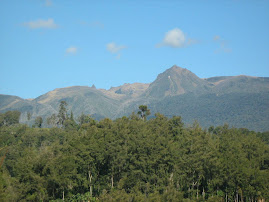
Beijing 2008 Olympic: the spirit of humanity
By Mathew Yakai in China
THE flame was passed up a line of five torchbearers to a Tibetan woman named Cering Wangmo on the summit of Mt Everest, the highest peak on earth Thursday May 8.
The other team members’ unfurled Chinese and Olympic flags as a Tibetan prayer flag lined the path and fluttered in the wind.
The jubilant group clustered together, shouting in Chinese, “We made it”, and “Beijing welcomes you.”
Chinese Central Television (CCTV) spent heavily to build a television studio at base camp and construct transmission points at four camps on the mountain face to telecast the historical event.
It was in the morning at around 7 am that day when I watched in my hotel room on TV. The atmosphere was a very emotional.
When the torch reached the peak of Mt Everest, I could not control my tears for one good reason, “China upholds the spirit of humanity by taking the Olympic flame up to an altitude of 5,200 meter for the world to see.”
China has lightened the world with the Olympic torch which represents peace and humanity. This complements well with the Beijing Olympic theme, “One world-One Dream”.
From my TV screen I could see the torch burning brightly given the harsh weather condition on the peak. But later I found out that the torch was designed by a Chinese company that specializes in burning systems for rockets. Fueled by propane, the flame burned brightly in the frigid, windy, oxygen-thin Himalayan air.
In the evening of that tearful and emotional Thursday, I caught up with a British chemistry lecturer at my university.
Bill Charlton invited me for dinner and few drinks. The hotel restaurant was filled with Chinese, except us the only foreigners, in a very welcoming usual Chinese atmosphere.
Our conversation was on the Olympic torch and china’s effort to commit itself in making the Olympic a successful event in the human history.
I jokingly asked Bill, “China made an international appeal by taking the Olympic torch to the highest peak on earth….what would the British do in 2012 Olympics in Britain.”
Bill answered, “Well, that’s a good question but Britain definitely need to learn from China’s experience.”
I jokingly replied, “Why not taking the flame down to the deepest ocean in the world in 2012?” We burst out laughing!
But he said, “Okay, then Britain has to build a technology in resemblance to submarine technology so that the flame still burns under a dense sea with no oxygen at all”.
We ended it like a joke but what is the analogy? China is giving prominence to an event that symbolizes unity, peace and prosperity by committing all its resources.
After its reform and opening up three decades ago, China has received a lot of criticism from both regional and international communities. Issues ranges from human rights, one party system, the Taiwan and Tibet issue, environmental issues and many others.
But China today stands one of the very active members of all the regional and international organizations including Association of Southeast Asian Nations (ASEAN), Asian Regional Forum (ARF), World Trade Organization (WTO), United Nations (UN) and a permanent member of the UN Security Council enjoying the veto power.
China has actively and tirelessly involved in the fight against SARS, human right issues, conflict crises like Darfur, environmental solutions to name the few.
So, China has received criticisms since its opening up, and turned those criticisms into fruitful solutions and that has empowered it to take the Olympic torch up to the highest peak on earth to show the world that China is a “dragon without tooth and flame tongue, but a friendly dragon.”
The people’s Olympic, the Beijing Olympic games will be an occasion to spread modern Olympic ideas while displaying splendid Chinese culture, Beijing's historical and cultural heritage, and its residents' positive attitudes.
It will also be an opportunity to advance cultural exchanges, to deepen understanding and friendship between the peoples of the world, and to promote harmonious development between mankind and nature.
It will be a time to promote healthy interaction between individuals and society and to foster mental and physical health.
In line with the "people-oriented" and "athletes-centered" ideas, Beijing will spare no efforts to provide quality services and to build a natural and social environment that will satisfy all the Games' participants.
But how did Olympic began and its importance that China needs to keep the spirit burning.
The ancient Greeks were highly competitive and believed strongly in the concept of "agon", or "competition" or "contest". The ultimate Greek goal was to be the best. All aspects of life, especially athletics, were centered on this concept.
It was therefore considered one of the greatest honors to win a victory at Olympia. The fact that the only prize given at Olympia was an olive wreath illustrates this point. The athletes competed for honor, not for material goods. Athletics were of prime importance to the Greeks. The education of boys concentrated on athletics and music as well as academic subjects such as philosophy.
In ancient Greece, games were closely connected to the worship of the gods and heroes.
From the beginning, the games at Olympia served as a bond between Greeks and strengthened the Greek sense of national unity.
During the Hellenistic period, Greeks who came to live in foreign surroundings such as Syria, Asia, and Egypt, strove to hold on to their culture. One of the ways to achieve this was to build athletic facilities and continue their athletic traditions.
They organized competitions, and sent competitors from their towns to compete in the Panhellenic games.
In the 2nd century A.D., Roman citizenship was extended to everyone within the Roman empire. From then on, the participation of many competitors from outside of Greece in the Olympic Games, gave them to a degree, international nature.
When the Greek government reinstated the games in 1896, this international character of the competitions was preserved by Baron de Coubertin. Now, 16 centuries later, the Olympic Games attract competitors from countries all over the world.
The best amateur athletes in the world match skill and endurance in a series of contests called the Olympic Games. Almost every nation sends teams of selected athletes to take part.
The purposes of the Olympic Games are to foster the ideal of a "sound mind in a sound body" and to promote friendship among nations.
The modern Olympic Games are named for athletic contests held in ancient Greece for almost 12 centuries. They were banned in AD 394 but were revived and made international in 1896.
The Winter Games were added in 1924. World War I and World War II forced cancellation of the Olympics in 1916, 1940, and 1944, but they resumed in 1948 and are held every four years.
After 1992 the Winter and Summer Games were no longer held within the same calendar year. Winter Games were scheduled for 1994, after only a two-year interval, and every four years thereafter.
The Summer Games were scheduled for 1996, and every four years thereafter.
The Olympic Games begun at Olympia in Greece in 776 BC.
China will in August 8 have its grand opening and begins with is the third Asian country to host the great game of humanity after Tokyo, Japan in 1964 and Seoul, South Korea in 1988.
Including Sydney 2000 Olympic will make China the fourth country to host the game in the region
As of today, Beijing has exactly 40 days on its Olympic calendar before the grand opening in August 8.
While the countdown is taking its course, the Olympic torch is still running its lag throughout most of the cities in China, and it’s expected to visit more then 100 cities where millions of Chinese will have the chance to see the flame.
Right after its overseas lag, the Olympic torch started its national lag in Wuhan City, Hubei province on May 31 and went through 32 cities. Its last city was Jiayuguan in Gansu province before arriving at Jinquan city, also in Gansu province today.
Tomorrow, the Olympic torch will visit Tianshui city, also in Gansu province, according to the official Olympic website.
The official website states that the Olympic torch will visit 53 more cities before arriving in Beijing on August 6 for the grand opening on August 8.
The May 12 Sichuan earthquake has brought together the spirit of oneness amongst the Chinese people. With this oneness today, the 1.3 billion people are ready to put all their efforts to welcome the international community to the Olympic game.
After the completion of its lag, the Olympic torch will reach Beijing on August 8 and gleam the entire China, a country, 30 years ago was very poor, but today enjoys one of the fastest ever economic growth in the history of humanity “One World-One Dream”, the slogan says it all, China is part of the international community, and wants to be seen as such through the Olympic spirit.
And through the spirit of Olympic, China wants to unite all countries in this century to live harmoniously.
Note: Asia-Pacific Perspective: China + looks at Chinese society, culture, economy, governance and China’s role within the Asia Pacific region and the world over. It mainly focuses on how PNG can learn from China’s experience. The writer is a PNG student in China. This article was published by Sunday Chronicle in Papua New Guinea and Island Sun in Solomon Islands on the 29th June, 2008.









No comments:
Post a Comment